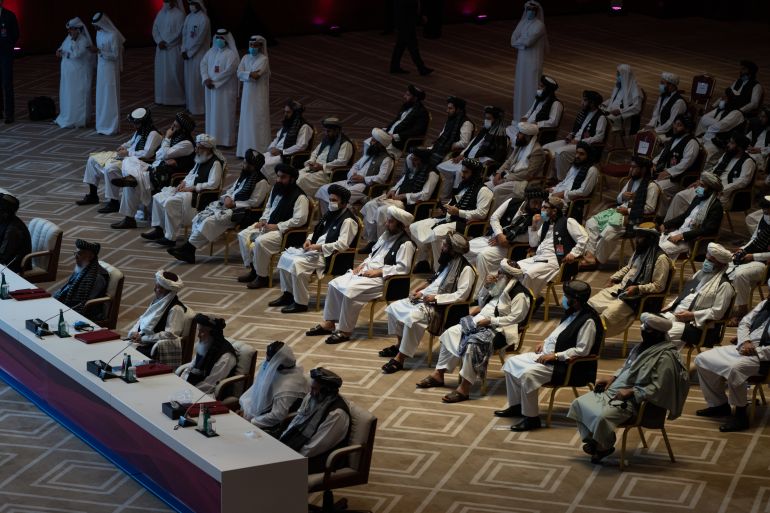Afghan rivals set to resume talks in Doha amid surge in violence
A road map for post-war Afghanistan and a nationwide ceasefire are part of the agenda of Tuesday’s talks.

Afghan government representatives and Taliban officials are set to resume peace talks in the Qatari capital, Doha, aimed at ending decades of conflict, even as journalists and opponents have been killed amid a surge in violence.
A road map for post-war Afghanistan and a nationwide ceasefire are part of the agenda of Tuesday’s talks. The first round of talks, which kicked off in September, ended last month after the rivals agreed on procedural rules.
Keep reading
list of 3 itemsWhat’s fueling Afghanistan’s meth boom?
Journalist shot dead in Afghanistan’s Ghazni city
The talks will also cover disarming tens of thousands of Taliban fighters and militias loyal to regional chieftains, some of them aligned with the government, as well as the rights of women and minorities.
“Lasting peace must be just, inclusive and must be built on views of all Afghans. It is clear that ceasefire is the absolute priority of our people and it must be the priority for negotiations,” Nader Nadery, a member of the government’s negotiation team, said in a Twitter post.
Both sides have shared proposals on the agenda of the talks but no agreement has been made on what topics would be prioritised.
The talks follow a landmark agreement signed in February between the Taliban and the United States, which envisioned the withdrawal of US troops from Afghanistan in exchange for security guarantees from the Afghan armed group.
US Special Representative for Afghanistan Reconciliation, Zalmay Khalilzad said he had returned to Doha with “expectations that the parties will make tangible progress in the next round of Afghanistan peace negotiations”.
“Both sides must demonstrate they are acting in the best interest of the Afghan people by making real compromises and negotiating an agreement on a political settlement as soon as possible and an immediate significant reduction in violence/cease-fire,” Khalilzad said in a Twitter post, after meeting Pakistani army chief General Qamar Javed Bajwa in Rawalpindi on Monday.
Surge in violence
Even as the talks begin, violence across Afghanistan has continued with a new trend of targeted killings of officials, activists and journalists.
For many Afghans, peace talks between the two rivals is a good start to end the decades-old war, but their frustration and fear grow as the near-daily attacks and explosions continue.
“We are hopeful to see a complete ceasefire in the country as an outcome to this round of talks and a significant decrease in violence,” Mujeebullah Dastyar, 31, a geographic information system specialist and freelance reporter in Kabul, told Al Jazeera.
“Despite the peace talks, Afghanistan has been covered in blood, many lost their loved ones. We want to see peace and development in the country.”
At least five journalists and the deputy governor of Kabul are among those killed since November. The Kabul government has blamed the Taliban for the killings, which the armed group has vehemently denied.
“Many journalists and media workers have been killed in past 12 months by unknown gunmen which nobody knows who are behind these attacks,” said journalist Hayatullah Amanat, who is based in Kabul.
“They are slow in progress with these talks and this will result in more people getting killed each day. The negotiators must have a sense of urgency and prioritise ceasefire.”
The US-led forces have carried out occasional raids amid the violence. On Monday, Taliban spokesman Zabihullah Mujahid said the US forces had conducted air attacks against the armed group’s fighters, violating the agreement between the two sides.
A spokesman for US forces, Colonel Sonny Leggett, said the strikes were defensive and not a violation of the agreement.
The US is withdrawing troops from Afghanistan after nearly 20 years – its longest overseas war. About 4,500 American troops are currently in Afghanistan.